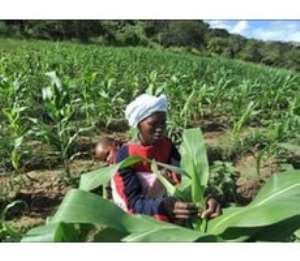
The shortfall between domestic production and consumption of maize is expected to reach 267,000 metric tonnes by 2015 if urgent measures are not put in place to address the yawning gap, projections by the Millennium Development Authority show.
The annual domestic deficit in maize, the largest staple crop in the country, is estimated to be between 84,000 and 145,000 metric tonnes. This represents a shortfall in domestic production of between 9 and 15 percent of total human consumption
Domestic maize production fell from 1,871,695 metric tonnes in 2010 to 1,683,984 metric tonnes in 2011, representing a decrease in production of the staple crop by 11 percent, data from Ministry of Food and Agriculture show.
The crop, which is the second-largest commodity crop in the country after cocoa, accounts for 50-60 percent of total cereal production and is an important crop for Ghana's agricultural sector and for food security.
Indeed, the shortfall in the production of the crop will adversely affect small income families who rely heavily on the staple crop as prices are likely to rise.
The poultry industry is the hardest hit. Estimated demand for maize for poultry feed is projected to grow from 73,000 metric tonnes in 2010 to 118,100 metric tonnes by 2015. However, poultry farmers may have to import expensive yellow maize to feed their birds, due to the inability to meet that demand locally.
Limited supply of maize for feed production has led to constraints in the growth of the poultry industry, resulting in significant growth in imports of poultry and other meats for consumption. This has led to an increase in poultry imports from abroad in recent years.
Global Food Security Index 2012, which is an assessment of food affordability, availability and quality, ranked Ghana 68th among 105 countries surveyed -- and scored the country 43.1 out of 100, where 100 represents the most favourable index.
High food prices, according to the Index, are an important cause of food insecurity.
The Chief Executive Officer of the National Food Buffer Stock Company (NAFCO), Mr. Eric Osei-Wusu, in a recent interview with the B&FT said there is a need for the country to strengthen its food security policies.
“Food affordability is also part of food security, and these are the things we need to strengthen to improve our food security status globally,” he said.
He said NAFCO is currently investing in securing more storage facilities as well as improving the whole value chain.
One of NAFCO's key responsibilities is to encourage farmers to produce more grains, which is its priority since it possesses the technology to store the products and release to the community appropriately in emergencies. This is why NAFCO guarantees fixed prices for grains to give the farmers a ready market, he added.
A major challenge to the activities of NAFCO is inadequate warehouses, and he blamed the private sector for not doing too well in that regard. He said there are a lot of warehouses, but this does not mean they are conducive to storing grains because the siting of a warehouse is crucial.




 NDC demands complete overhaul of security protocols at EC to safeguard electoral...
NDC demands complete overhaul of security protocols at EC to safeguard electoral...
 Ghana reaches interim deal with international bondholders — Finance Ministry
Ghana reaches interim deal with international bondholders — Finance Ministry
 Mahama to form joint army-police anti-robbery squads to safeguard 24-hour econom...
Mahama to form joint army-police anti-robbery squads to safeguard 24-hour econom...
 Another man jailed eight months over shrinking penis
Another man jailed eight months over shrinking penis
 Ghana to adjust external bond deal to meet IMF debt sustainability goals — Finan...
Ghana to adjust external bond deal to meet IMF debt sustainability goals — Finan...
 IMF negotiations: We've not failed to reach an agreement with bondholders; we’ve...
IMF negotiations: We've not failed to reach an agreement with bondholders; we’ve...
 EC begins recruitment of temporary electoral officials, closes on April 29
EC begins recruitment of temporary electoral officials, closes on April 29
 NPP lost the 2024 elections in 2022 due to inflation and cedi depreciation — Mar...
NPP lost the 2024 elections in 2022 due to inflation and cedi depreciation — Mar...
 Your good heart towards Ghana has changed; don’t behave like Saul - Owusu Bempah...
Your good heart towards Ghana has changed; don’t behave like Saul - Owusu Bempah...
 Wa West: NDC organizes symposium for Vieri Ward Women
Wa West: NDC organizes symposium for Vieri Ward Women
